The EU makes for an easy target these days when it comes to being considered a strategic actor in global affairs. Many analysts, myself included, have a tendency to explain that by pointing to the union’s lack of security bona fides. But there’s more to it than just the question of how many divisions Europe has, to paraphrase Stalin, or of who to call when you want to call Europe, to quote Kissinger. EU Council President Herman Van Rompuy himself put it best when he observed, only half-jokingly, that the EU has plenty of strategic partnerships — now all it […]
Latest Archive
Free Newsletter
Because of budgetary belt-tightening on both sides of the Channel, it’s become increasingly common to hear about the logic and necessity of defense cooperation between France and Britain. The fact that this has moved beyond the realm of wild speculation and is indeed considered imminent by most serious observers is a testament to the sea change that’s occurred, primarily in British defense thinking in a very short time. Consider that just last spring, when a U.K. Defense Ministry green paper even suggested the need for greater bilateral cooperation, it made headlines. Nevertheless, wild speculation has persisted about that cooperation, which […]
I’m presently putting together an upcoming feature issue on culture and international relations, of which one article will focus on culture as an instrument, and object, of national power — essentially a discussion of certain elements of soft power. So this article in Der Spiegel about how 1980s-era nightclubs catering to U.S. military personnel stationed in West Berlin and elsewhere in West Germany impacted West German culture — in this case, popular music — leaped out at me. It echoes an article I read several years ago about the way in which American GIs made a real cultural impact in […]
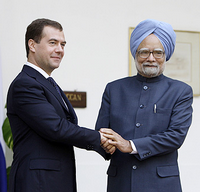
Last week India and Russia finalized plans to deliver 250 to 300 jointly developed fifth-generation fighter aircraft (FGFA) and 45 multirole transport aircraft (MTA) to India over the next decade. The Indian defense minister underlined that these would be the flagship Indo-Russian joint development projects, building on the success of the Brahmos cruise missile program as a model. Some wrinkles remain in the two countries’ defense partnership. India raised the issue of inordinate delays in the delivery of Russian defense systems, which result in considerable cost escalation. For instance, India will end up paying Russia $2.34 billion for the delivery […]
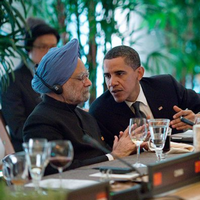
In advance of President Barack Obama’s visit to India next month, the administration is sending signals about great and wondrous changes ahead in the Indo-American relationship. But in reading Lalit K. Jha’s dispatch from Washington, a term I have come to dread in foreign policy rhetoric made its predictable appearance: Obama’s visit is supposed to herald the establishment of a “true strategic partnership.” “Strategic partnership” entered the U.S. diplomatic lexicon as a way to find a halfway house between those countries that are formal American allies — especially those for whom this status is a matter of treaty and Congressional […]
U.S. Secretary of State James Steinberg spoke about U.S. policy toward Asia on Oct. 13 at the Carnegie Endowment for International Peace in Washington. Steinberg said U.S. policy toward Asia consists of three dimensions: strengthening and revitalizing traditional alliances; building new relationships with emerging regional powers; and strengthening multilateral and regional cooperation. His speech focused on the last of those three dimensions.
Judy Dempsey offers a typically insightful piece on the challenges facing the EU at the U.N. these days. Ironically, Dempsey pivots off of Germany’s election as a non-permanent member of the council, whereas the real news of this year’s batch of non-permanent members is the presence of India and South Africa. With Brazil already there from last year, that means the council will now include all the member states of IBSA and BRIC, with Turkey thrown in for good measure. We already got a taste this spring of what an alternative emerging powers line at the UNSC could look like […]

BEIJING — Urban legend tells of an American businessman who, visiting a factory in China’s Guangdong Province, witnesses working conditions forbidden by Chinese law. When he inquires about them, the factory owner replies sharply, “Laws made in Beijing mean nothing in Guangdong.” Though apocryphal, the story reflects the localism and institutional inconsistency that are core aspects of the modern Chinese economy. Mao Zedong’s attempts to bring centralization and uniformity to an economic system of continental proportions resulted in paralysis. In the reform era, previously suppressed network connections have regenerated quickly, resulting in increasing heterogeneity and even fragmentation within the economic […]
Just after posting this item on the implications of this year’s UNSC configuration, I read Michel Real’s contribution to the IFRI yearbook, “La Fin du Monde Unique.” Real’s article examines the way in which Russia and China have used the Shanghai Cooperation Organization to arrive at a modus vivendi in Central Asia, and what leaped out at me was his reference to the SCO as an “instrument of mutual neutralization.” That’s what I was driving at with the previous post, when I referred to both the absence of a unifying South-South agenda, and the possibility that a reactive anti-Westernism might […]
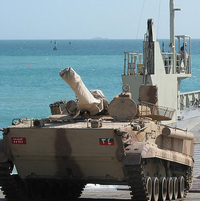
While Western diplomats and sanctions-enforcers ply their trade to pressure Iran into stopping its uranium enrichment, much of the Middle East is already preparing for war. Headlines might focus on United Nations resolutions initiated by Western powers, or on fiery speeches delivered by Iranian President Mahmoud Ahmadinejad. But just a few hundred miles from Tehran, the Arab countries of the Persian Gulf have launched a race to arm themselves with an urgency and intensity reminiscent of America’s defense build-up prior to its entry into World War II. The magnitude of the weapons purchases is nothing short of astounding and the […]

Deputy Secretary of Defense William Lynn recently caused a stir in official Washington by publicly confirming that the Pentagon had suffered a massive computer breach in 2008. A foreign intelligence service successfully slipped an infected flash drive into a Central Command computer. The drive contained software that surreptitiously spread through both classified and unclassified government networks, establishing a “digital beachhead, from which data could be transferred to servers under foreign control.” According to Lynn, “it was a network administrator’s worst fear.” In addition to confirming the breach, Lynn previewed the Defense Department’s cyber strategy, expected to be finalized by the […]
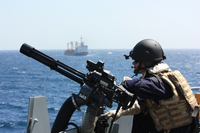
A multinational flotilla of warships has been assembled off the coast of Somalia to do what warships have done for as long as navies have existed: fight pirates. However, the combined efforts of France, Britain, Russia, China, India, the United States, and others have not sufficed to prevent the pirates from targeting ships across the breadth of the Indian Ocean. In much the same way that poorly equipped insurgents are resisting U.S. military efforts in Afghanistan, impoverished Somalis continue to frustrate the great naval powers. Indeed, counterpiracy and counterinsurgency share a common frailty: Both lack good metrics for evaluating success, […]
Few would have expected it to be possible a few months ago, but Kyrgyzstan managed to hold a free, fair, and surprisingly non-violent and trouble-free parliamentary election this weekend. In an assessment widely shared by regional experts, David Trilling, writing at EurasiaNet, concluded, “Kyrgyzstan’s parliamentary elections couldn’t have gone better.” Turnout exceeded 50 percent of the country’s 2.8 million eligible voters and produced sharply divided results that will force political leaders to compromise to form a coalition government. Five political parties, out of the 29 that participated, overcame the 5 percent threshold required to receive seats in the 120-member parliament. […]
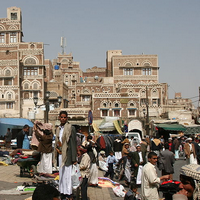
The recent rocket attack on a convoy carrying British embassy staff in the Yemeni capital of San’a raises important questions about security and terrorism in that Gulf country. The United States is currently proposing to allocate $1.2 billion of military equipment and training over the next six years to combat al-Qaida in Yemen. In response, critics both within and beyond government circles are calling for a more holistic approach that focuses on long-term economic development and stability there and in the wider Middle East region. Presently lacking in this debate is the understanding that security and development are not mutually […]
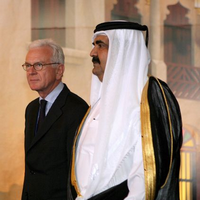
The United States and Europe are pressuring oil-rich members of the Gulf Cooperation Council (GGC) to forge closer ties with Yemen in a bid to link the fight against al-Qaida to tangible economic benefits for the Arab world’s poorest nation. U.S. officials say the Obama administration recently conveyed to GCC leaders Yemen’s reiteration of its 10-year-old request for GCC membership. The officials believe that U.S. and European endorsement of the request will prompt GCC leaders to respond more favorably when they meet in Abu Dhabi in December. The U.S. and Europe are exerting pressure against the backdrop of an increasing […]
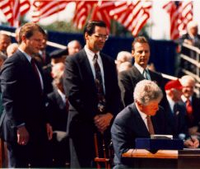
In his 1996 classic, “The Clash of Civilizations,” Samuel Huntington characterized Mexico as a “torn country” — a condition produced by the Westernizing instincts of its elites pulling against the weight of its cultural heritage. Today, however, Mexico is not torn by internal discord, its drug violence notwithstanding. Rather, it is trapped — caught between dynamic global trends washing over Latin America on one hand, and the dogged political realities of North America on the other. In heralding the end of trade barriers between Mexico, the United States and Canada, the North American Free Trade Agreement (NAFTA) cast modern Mexico’s […]
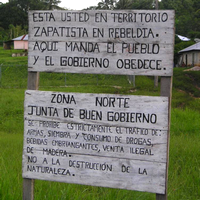
In the first light of dawn on New Year’s Day 1994, indigenous campesinos wearing ski masks and toting assault weapons stormed major towns in the southeastern Mexican state of Chiapas. By midday, the Zapatista Army of National Liberation (EZLN, in Spanish) had introduced itself to the world as the new face of social revolution. The nature of this face — or more accurately, the lack thereof — immediately distinguished the movement. Black balaclavas, worn at all times in public, along with the rugged attire of the indigenous population, captivated the lenses of the world’s media. So did the eloquent dispatches […]
